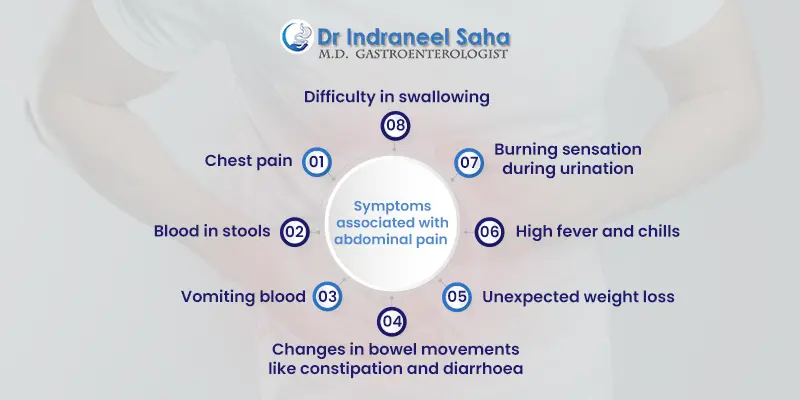- 12th Mar, 2025
- Abdominal Doctor, Gastroenterologist
Abdominal Pain: Symptoms, Causes, Types & Treatment
Abdominal pain is a common complaint. Almost everyone has experienced discomfort at some point in their lives. While most of the time it is not serious and usually goes away on its own. However, there are instances where the pain indicates a more serious concern and requires immediate attention.
Abdominal pain can arise from a variety of issues, from minor digestive problems to more serious conditions. Moreover, it can also vary in location, intensity and nature.
If you are experiencing persistent abdominal discomfort, it is important to consult a doctor for stomach pain to get an effective diagnosis and treatment.
In this blog, we will delve into some of the potential causes of abdominal pain along with its types and availability of treatment options.
Types of Abdominal Pain
There are different types of abdominal pain. Recognizing the severity is essential to know when it’s time to seek medical advice.
- Acute, which lasts up to 1 week
- Chronic, which lasts at least 3 months
- Progressive, which eventually worsens over time and is accompanied by other symptoms.
- Intermittent, which comes and goes suddenly.
Now abdominal pain can also be classified into other categories based on the nature of the pain. Here are some of them.
- Sharp pain where an individual experiences a sudden and intense ache.
- Dull pain where the patient experiences stomach aches less persistently and is also not that severe.
- Bloating is where there is always a feeling of fullness in the abdomen.
- Cramping pain is where an individual feels like a stabbing ache because of muscle contractions.
Symptoms Associated with Abdominal Pain
An individual might experience other symptoms in addition to the abdominal discomfort. Dr. Indraneel Saha, a reputed doctor for stomach pain, lists the following signs.
- Chest pain
- Blood in stools
- Vomiting blood
- Changes in bowel movements like constipation and diarrhoea
- Unexpected weight loss
- High fever and chills
- Burning sensation during urination
- Difficulty in swallowing

In most cases, any of these additional troublesome signs signify a serious issue that requires immediate medical advice.
Causes of Abdominal Pain
As mentioned, there can be numerous causes of abdominal pain. The below are the most common ones.
Digestive Disorders: Abdominal pain emerging from digestive disorders usually happens after eating, especially when the body finds it difficult to digest the food. It can develop as a result of any of the following conditions.
- Indigestion
- Constipation
- Food poisoning
- Food allergies
- Diarrhoea
Reproductive Issues: Women experience abdominal pain when there is pressure or inflammation in the reproductive organs resulting from.
- Menstrual cramps
- Ovarian cysts
- Endometriosis
Infections: Infection or irritation in the digestive organs causes temporary inflammation accompanied by stomach aches such as
- Peptic ulcers
- Chronic acid reflux
- Inflammatory bowel disease (IBD)
- Gastroenteritis
- Gastritis
Urinary Issues: Urinary problems are common and mostly occur when bacteria enter the body. It causes abdominal pain along with other symptoms like runny nose, chills and headache.
- Urinary tract infections
- Kidney stones
- Bladder inflammation
Treatment For Abdominal Pain
According to Dr. Indraneel Saha, the treatment for abdominal pain begins after a proper diagnosis to confirm the actual reasons behind the ache. Some of the modalities that doctors employ are:
Medications: There are both over-the-counter and prescription drugs that help to get rid of abdominal pain resulting from gas or acidity.
Home Care: It mainly includes making dietary changes, keeping yourself hydrated and using a heating pad, especially during menstrual cramps.
Surgery: Surgical intervention is recommended in the advanced stage when there is no other option than to remove the organ, like in the case of gallstones or appendicitis.
Conclusion
Abdominal pain is inevitable; it can happen to anyone due to several reasons. However, it is necessary to understand the subtle signs that can signal a serious complication. In case your stomach discomfort continues for more than 48 hours, make sure to talk to a doctor for stomach pain.